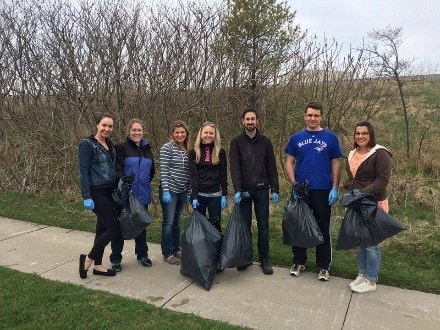MATERIALITY
Helping our clients meet their sustainability goals
At a global level, Golder works with thousands of clients across the infrastructure, power, manufacturing mining, and oil and gas sectors who each have their own sustainable development goals. Through the skills and expertise we provide, we align with their priorities to improve the sustainability of their projects. We consider the following UN Sustainable Development Goals to be most relevant to our work for our clients and our operations.
Ensure healthy lives and promote well-being for all at all ages.
This speaks to our internal HSSE commitments and the programs and initiatives designed to continually improve HSSE outcomes.
Clean Water and Sanitation
Ensure availability and sustainable management of water and sanitation for all.
Industry, Innovation, and Infrastructure
Build resilient infrastructure, promote inclusive and sustainable industrialization and foster innovation.
Responsible Consumption and Production
Ensure sustainable consumption and production patterns.
Life on Land
Protect, restore and promote sustainable use of terrestrial ecosystems, sustainably manage forests, combat desertification, and halt and reverse land degradation and halt biodiversity loss.
Ensure incisive and equitable quality education and promote lifelong learning opportunities for all.
This links to our ongoing support for professional development and in-house learning opportunities, and our support for education through the Golder Trust for Orphans.
Affordable and Clean Energy
Ensure access to affordable, reliable, sustainable and modern energy for all.
Sustainable Cities and Communities
Make cities and human settlements inclusive, safe, resilient and sustainable.
Take urgent action to combat Climate change and its impacts
Peaceful and inclusive societies for sustainable development, provide access to justice for all and build effective and accountable and inclusive institutions at all levels.
This relates to our focus on anti-bribery and anti-corruption, and the effort made to educate our people about these issues and their prevention.
Achieve gender equality and empower all women and girls.
This connects to the diverse profile of our organisation and our recognition of its inherent value.
Promote sustained, inclusive and sustainable economic growth, full and productive employment and decent work for all.
As an independent employee-owned company the future sustainability of Golder is an internal business imperative and is reflected in the attention of our Board.
Ensure sustainable consumption and production patterns.
Here our commitment to reduction of waste and carbon emissions is demonstrated by our actions.
Life Below Water
Conserve and sustainably use the oceans, seas and marine resources for sustainable development.
2016/2017 Employee Materiality Survey Analysis
Golder regularly surveys its people to gain a greater insight into how our colleagues understand, prioritize, and act on issues related to sustainability. In 2017, more than 1,100 people replied to the survey, representing a 40% increase in participation. It is our goal to continue to increase participation in this survey year over year, gathering feedback and opinions from our people and demonstrating our commitment to using this information to shape, implement and improve our sustainability program.
2016/2017 Materiality Survey Stats
Q1. Which of these groups do you belong to?

Q2. Which operating group are you part of?

Q3. As an employee, how important is it to you that Golder operates as an environmentally sustainable and socially responsible organisation?
- 50% EXTREMELY IMPORTANT
- 38% QUITE IMPORTANT
- 10% SOMEWHAT IMPORTANT
- 2% SLIGHTLY IMPORTANT
- 1% NOT AT ALL IMPORTANT
Q4. How important is it to you that Golder minimises its carbon emissions in all aspects of its operations?
- 35% EXTREMELY IMPORTANT
- 42% QUITE IMPORTANT
- 17% SOMEWHAT IMPORTANT
- 4% SLIGHTLY IMPORTANT
- 3% NOT AT ALL IMPORTANT
Q5. How important is it to you that Golder minimises waste (energy, water and physical resources) in all aspects of its operations?
- 47% EXTREMELY IMPORTANT
- 39% QUITE IMPORTANT
- 11% SOMEWHAT IMPORTANT
- 3% SLIGHTLY IMPORTANT
- 1% NOT AT ALL IMPORTANT
Q6. How important is it to you that Golder is recognised as a provider of sustainable solutions to clients in select markets?
- 52% EXTREMELY IMPORTANT
- 37% QUITE IMPORTANT
- 9% SOMEWHAT IMPORTANT
- 2% SLIGHTLY IMPORTANT
- 1% NOT AT ALL IMPORTANT
Q7. How important is it to you that Golder does not condone the abuse of human rights as an employer and through its supply chain?
- 84% EXTREMELY IMPORTANT
- 13% QUITE IMPORTANT
- 3% SOMEWHAT IMPORTANT
- 1% SLIGHTLY IMPORTANT
- 1% NOT AT ALL IMPORTANT
Q8. How important is it to you that Golder is affiliated to a global entity that promotes a sustainable global economy?
- 42% EXTREMELY IMPORTANT
- 37% QUITE IMPORTANT
- 15% SOMEWHAT IMPORTANT
- 3% SLIGHTLY IMPORTANT
- 3% NOT AT ALL IMPORTANT
- Turn off lights, monitors, TVs, etc when not in use – do not let them run 24/7.
- Most offices reported the air condition was too cold in summer, requiring extra clothing in the office – turning up air conditioning to compensate for summer clothing would save significant costs in electricity and create a healthier environment.
- Minimise the use of paper and other consumables, use recycled/fillable products where possible (we currently don’t do this across all offices).
- Avoid coffee machine that uses pods – use biodegradable ones or brew with freshly ground beans.
- We do not have consistency in recycling paper, plastics and organics program (composting or bakashi bins) across the offices.
- Send bathroom paper towels to recycling.
- Single use plastic is one of the biggest waste problems in the world today.
- Disposable cups/plates/utensils are unnecessary, use the real thing and wash it for repeat use.
- Disposable coffee cups are becoming a major source of waste, we can transition people to re-usable cups.
- Use jugs of water and glasses in meetings, not individual throw away water bottles.
- Reduce carbon footprint by minimising travel – can staff meet on Skype, take a train instead of a plane (in some countries this is a feasible option), public transport instead of a taxi or private car.
- Encourage the addition of cars rather than trucks, especially plug-in EV or hybrids.
- When the opportunity to relocate an office arises, consider public transport routes.
- Encourage cycling to work.
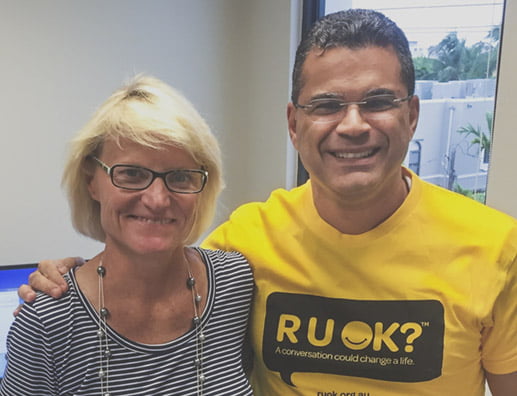 In response to work started in 2015 on psychologically-healthy workplaces, the first Global RU OK? Day was held on September 8, 2016. Timed to coincide with World Suicide Prevention Day, Golder offices around the globe paused to focus on health and wellbeing and extend caring to our colleagues by asking this simple question. On September 14, 2017, Golder employees around the globe came together again to ask “RU OK?” Employees are reminded and encouraged to check in with one another each day.
In response to work started in 2015 on psychologically-healthy workplaces, the first Global RU OK? Day was held on September 8, 2016. Timed to coincide with World Suicide Prevention Day, Golder offices around the globe paused to focus on health and wellbeing and extend caring to our colleagues by asking this simple question. On September 14, 2017, Golder employees around the globe came together again to ask “RU OK?” Employees are reminded and encouraged to check in with one another each day.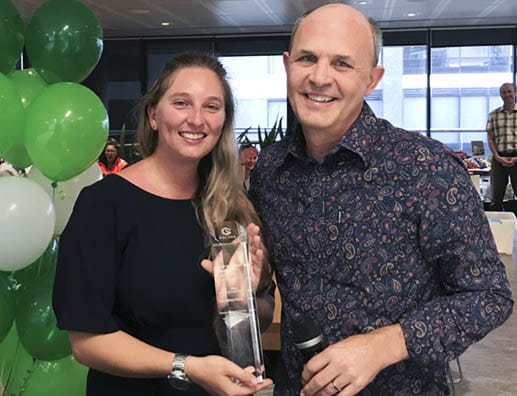 Bianca Vanzati from the Brisbane (Australia) office is the 2017 Care for our Future award winner recognizing the intentional investment she has made in mentoring, coaching and instruction in health, safety and security, on a day-to-day basis.
Bianca Vanzati from the Brisbane (Australia) office is the 2017 Care for our Future award winner recognizing the intentional investment she has made in mentoring, coaching and instruction in health, safety and security, on a day-to-day basis.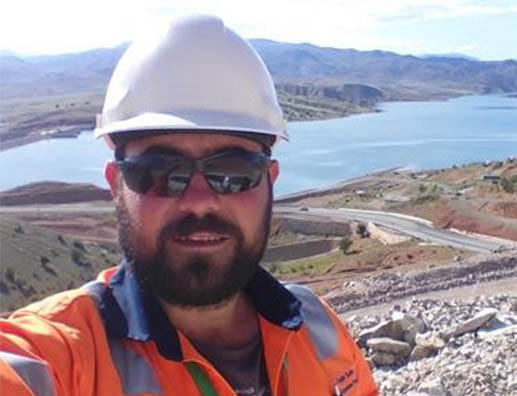 Yasin Akçay, from our Ankara office in Turkey is the 2017 winner in the Responsive Measures category recognizing exemplary actions taken in response to unforeseen events that endangered the health, safety and security of our people and others.
Yasin Akçay, from our Ankara office in Turkey is the 2017 winner in the Responsive Measures category recognizing exemplary actions taken in response to unforeseen events that endangered the health, safety and security of our people and others.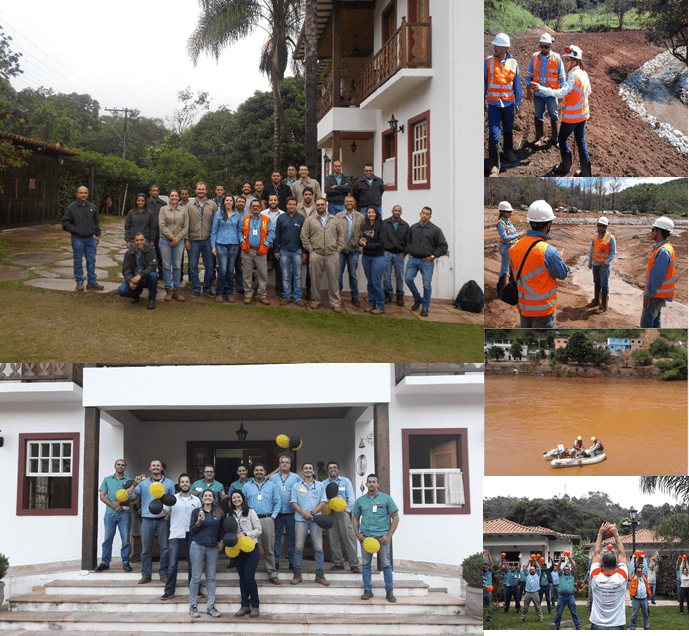 The winner in the Proactive Measure category was the Samarco Renova Project Team (Brazil), recognizing their work in identify and mitigate risk, resulting in preservation of the health, safety and security of our people and others.
The winner in the Proactive Measure category was the Samarco Renova Project Team (Brazil), recognizing their work in identify and mitigate risk, resulting in preservation of the health, safety and security of our people and others. This award recognized a comprehensive program of proactive measures by a project team. The Sydney Metro City and Southwest Geotechnical Investigation team delivered a large, technically complex investigation, with an extremely high public profile, including significant political and media attention, through exemplary planning and rigorous execution. A number of best practices for projects of this nature were implemented, including hazard identification workshops, sub-contractor on-boarding and Permit to Work processes. The result in this case was project delivery with zero injuries and a very satisfied client. Golder has since publicized these best practices and broadened their application throughout the company.
This award recognized a comprehensive program of proactive measures by a project team. The Sydney Metro City and Southwest Geotechnical Investigation team delivered a large, technically complex investigation, with an extremely high public profile, including significant political and media attention, through exemplary planning and rigorous execution. A number of best practices for projects of this nature were implemented, including hazard identification workshops, sub-contractor on-boarding and Permit to Work processes. The result in this case was project delivery with zero injuries and a very satisfied client. Golder has since publicized these best practices and broadened their application throughout the company. This award recognized exemplary actions taken in response to unforeseen events that endangered the health, safety and security of our staff and others. The specific circumstances around this award involved a medical emergency on site experienced by a subcontractor, leading to a loss of consciousness, falling from height and significant injuries. Golder’s field personnel responded immediately as a team. Their actions were recognized by the attending physician as limiting the health consequences for the injured worker, and by the subcontractor’s management who noted “the professional response by the Golder team was exactly what we would hope for from an associated party in such circumstances”. The subcontractor recognized this response by making a contribution to the Golder Trust for Orphans. The Golder team followed up both by checking on the status of the subcontractor employee, and by introducing new work practices, adopted by Golder and the subcontractor, to limit the consequences of any future emergency of this nature.
This award recognized exemplary actions taken in response to unforeseen events that endangered the health, safety and security of our staff and others. The specific circumstances around this award involved a medical emergency on site experienced by a subcontractor, leading to a loss of consciousness, falling from height and significant injuries. Golder’s field personnel responded immediately as a team. Their actions were recognized by the attending physician as limiting the health consequences for the injured worker, and by the subcontractor’s management who noted “the professional response by the Golder team was exactly what we would hope for from an associated party in such circumstances”. The subcontractor recognized this response by making a contribution to the Golder Trust for Orphans. The Golder team followed up both by checking on the status of the subcontractor employee, and by introducing new work practices, adopted by Golder and the subcontractor, to limit the consequences of any future emergency of this nature. This award recognized an individual who demonstrated intentional investment in mentoring, coaching and instruction in health, safety and security, on a day-to-day basis, and was won by Heather Di Lauro from the Leeds, United Kingdom, office. Heather, a compelling role model for both junior and senior staff, demonstrated exemplary health and safety performance, and developed a group of staff who routinely implemented best practices in the area of health, safety, security and the environment.
This award recognized an individual who demonstrated intentional investment in mentoring, coaching and instruction in health, safety and security, on a day-to-day basis, and was won by Heather Di Lauro from the Leeds, United Kingdom, office. Heather, a compelling role model for both junior and senior staff, demonstrated exemplary health and safety performance, and developed a group of staff who routinely implemented best practices in the area of health, safety, security and the environment. This award recognized an outstanding contribution in the area of proactive measures to identify and mitigate risk, resulting in preservation of the health, safety and security of our people and others. The global emphasis placed on fatality prevention and six Fatal Risk Controls is a result of the passion and personal initiative of Andy Haynes. Andy’s effort powerfully illustrates the contribution a single individual can make, and because of his inspirational leadership we have adopted a simple yet powerful approach to address our highest consequence risks.
This award recognized an outstanding contribution in the area of proactive measures to identify and mitigate risk, resulting in preservation of the health, safety and security of our people and others. The global emphasis placed on fatality prevention and six Fatal Risk Controls is a result of the passion and personal initiative of Andy Haynes. Andy’s effort powerfully illustrates the contribution a single individual can make, and because of his inspirational leadership we have adopted a simple yet powerful approach to address our highest consequence risks.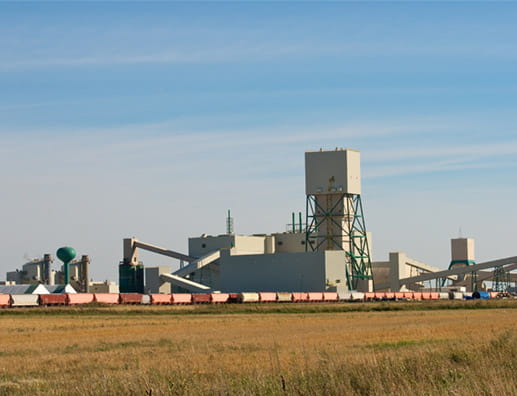 A Golder project team working on BHP Billiton’s Jansen project finished first in the Summer Safety Campaign conducted on site. Jansen is a $14B potash mining operation, located approximately two hours east of Saskatoon. Golder has been an active partner in this project since 2014 and has been providing quality assurance / quality control material testing and surveying services for the construction of the mining shafts (shaft sinking) as well as various above-ground construction projects.
A Golder project team working on BHP Billiton’s Jansen project finished first in the Summer Safety Campaign conducted on site. Jansen is a $14B potash mining operation, located approximately two hours east of Saskatoon. Golder has been an active partner in this project since 2014 and has been providing quality assurance / quality control material testing and surveying services for the construction of the mining shafts (shaft sinking) as well as various above-ground construction projects.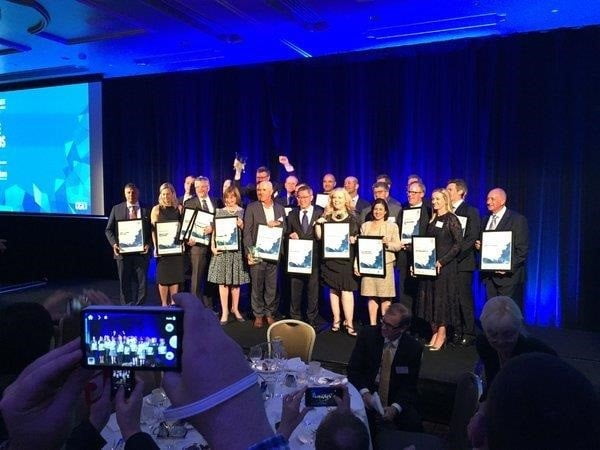 The Client Choice awards are organized and governed by Beaton Research and Consulting, an independent benchmarking and customized research consulting group serving organizations that provide professional, financial and member services to clients worldwide. These awards are conducted in partnership with the Australian Financial Review.
The Client Choice awards are organized and governed by Beaton Research and Consulting, an independent benchmarking and customized research consulting group serving organizations that provide professional, financial and member services to clients worldwide. These awards are conducted in partnership with the Australian Financial Review.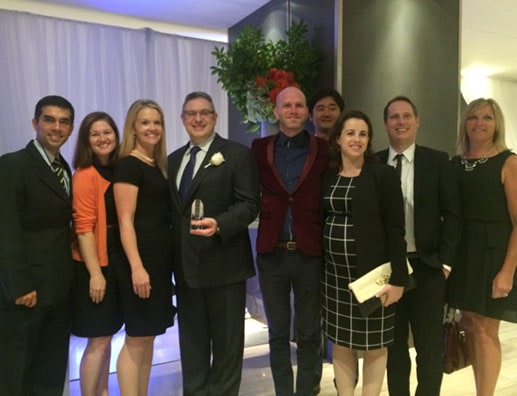 Golder’s Canadian Legal Team was honored with the Risk Management, Small Department award in the 4th Annual Innovatio Awards. The team continued their internal “Making Legal Services Better” campaign with a focus on risk management as a key vehicle for the legal department to help improve Golder’s risk management.
Golder’s Canadian Legal Team was honored with the Risk Management, Small Department award in the 4th Annual Innovatio Awards. The team continued their internal “Making Legal Services Better” campaign with a focus on risk management as a key vehicle for the legal department to help improve Golder’s risk management.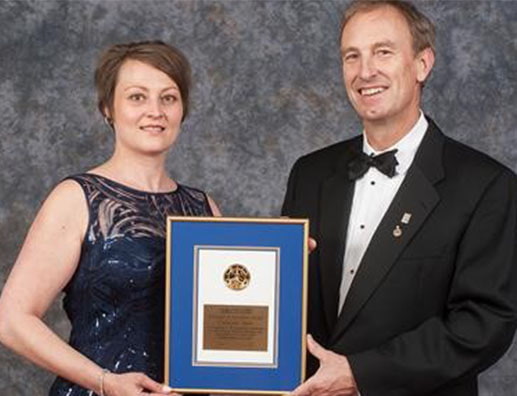 Catharine Shaw, Mining Client Program Manager from the Toronto (Canada) Office, was the first-ever recipient of the Diversity and Inclusion Award, given by the Canadian Institute of Mining, Metallurgy and Petroleum (CIM).
Catharine Shaw, Mining Client Program Manager from the Toronto (Canada) Office, was the first-ever recipient of the Diversity and Inclusion Award, given by the Canadian Institute of Mining, Metallurgy and Petroleum (CIM).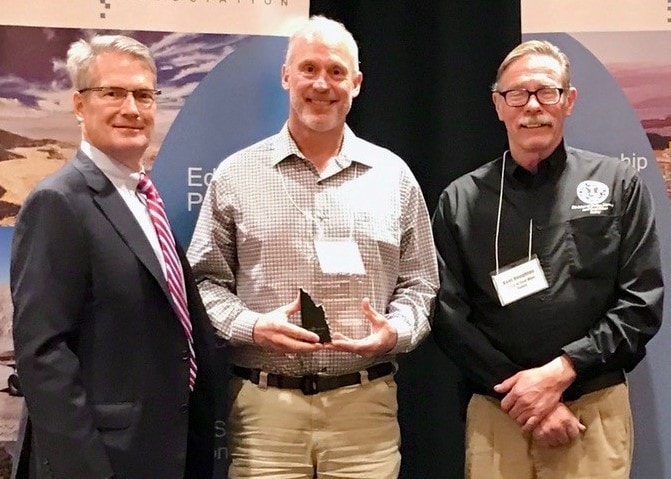 Kevin Anderson (left) VP, Utah Mining Association and Kent Houghton (right), Director of the Office of Coal Mine Safety at the Utah Labor Commission present safety award to Golder’s Dave Fadling at a ceremony in Salt Lake City on April 12, 2017.
Kevin Anderson (left) VP, Utah Mining Association and Kent Houghton (right), Director of the Office of Coal Mine Safety at the Utah Labor Commission present safety award to Golder’s Dave Fadling at a ceremony in Salt Lake City on April 12, 2017.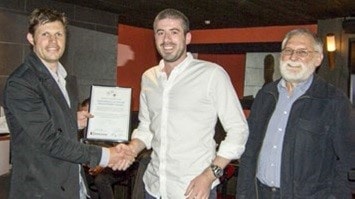 The Australian Geomechanics Society 2016 Don Douglas Youth Fellowship Award for the most outstanding Australian paper at the 11th Australia and New Zealand Young Geotechnical Professionals Conference was made to Nigel Ruxton, Design Group Leader in the Brisbane (Australia). Nigel’s paper, Geotechnical Challenges of Brownfield Sites for Use as Landfill, detailed the Queensland Waste Management Team’s work to develop a 3D model of underground mine workings and the detailed design for a challenging brownfield landfill in south-east Queensland.
The Australian Geomechanics Society 2016 Don Douglas Youth Fellowship Award for the most outstanding Australian paper at the 11th Australia and New Zealand Young Geotechnical Professionals Conference was made to Nigel Ruxton, Design Group Leader in the Brisbane (Australia). Nigel’s paper, Geotechnical Challenges of Brownfield Sites for Use as Landfill, detailed the Queensland Waste Management Team’s work to develop a 3D model of underground mine workings and the detailed design for a challenging brownfield landfill in south-east Queensland.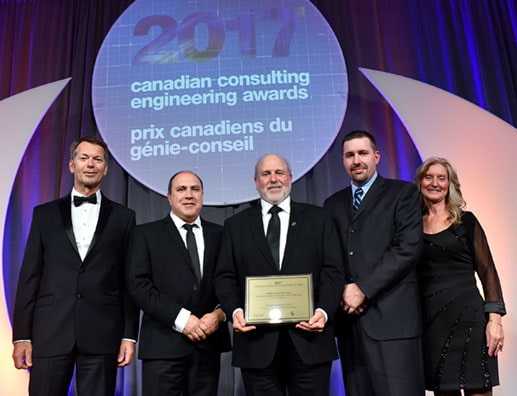 Golder was recognized for engineering excellence at the 2017 Canadian Consulting Engineering Awards, held in Ottawa, Canada. Golder received an Award of Excellence for the
Golder was recognized for engineering excellence at the 2017 Canadian Consulting Engineering Awards, held in Ottawa, Canada. Golder received an Award of Excellence for the 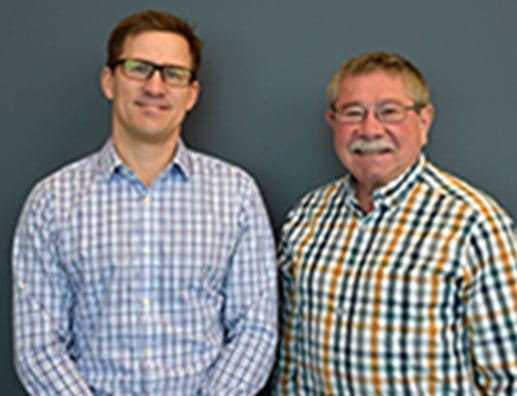 Significant material saving on fit for purpose design: Peter Thomson and Dennis Becker, Principals and Senior Geotechnical Engineers form the Calgary, (Canada) office, are the Victor Milligan Award Winners for 2017 for the work they have done on a fit-for purpose design of driven steel pipe piles for a large oil and gas processing facility in the Fort McMurray area. Their collaborative and innovative method presented in their paper resulted in savings of millions of dollars while maintaining the integrity and safety of structures on the large industrial project.
Significant material saving on fit for purpose design: Peter Thomson and Dennis Becker, Principals and Senior Geotechnical Engineers form the Calgary, (Canada) office, are the Victor Milligan Award Winners for 2017 for the work they have done on a fit-for purpose design of driven steel pipe piles for a large oil and gas processing facility in the Fort McMurray area. Their collaborative and innovative method presented in their paper resulted in savings of millions of dollars while maintaining the integrity and safety of structures on the large industrial project.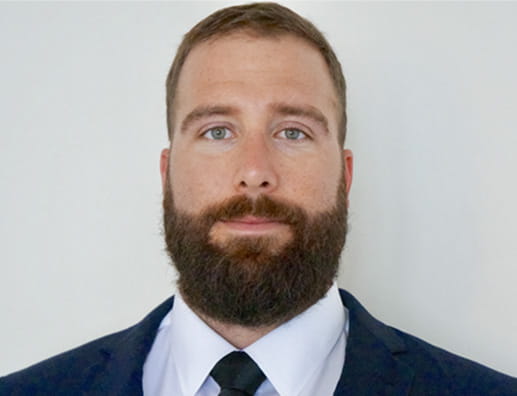 2016 Winner: Jason Cox
2016 Winner: Jason Cox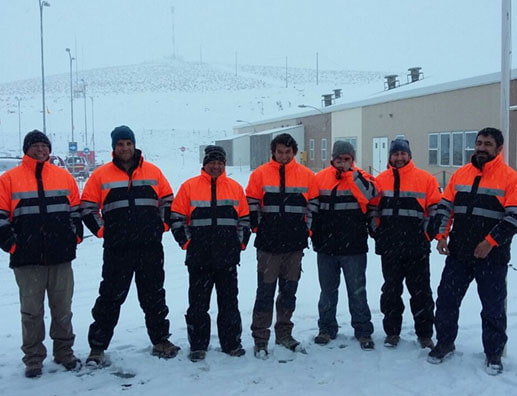 Golder Associates received a safety award from Teck as part of the team working in a geotechnical field campaign, including borehole drilling, test pit excavations and surface geophysics carried out on the Quebrada Blanca project (Northern Chile).
Golder Associates received a safety award from Teck as part of the team working in a geotechnical field campaign, including borehole drilling, test pit excavations and surface geophysics carried out on the Quebrada Blanca project (Northern Chile). Each year our organisation advances in its goal to provide innovative sustainable solutions for our clients’ projects, while at the same time reducing carbon consumption and contributing to the preservation of natural capital. Before delving into our projects, let’s consider the current state of the planet.
Each year our organisation advances in its goal to provide innovative sustainable solutions for our clients’ projects, while at the same time reducing carbon consumption and contributing to the preservation of natural capital. Before delving into our projects, let’s consider the current state of the planet.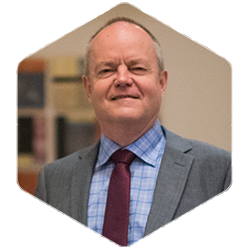 Sustainability, has been core to Golder’s mission since the company was formed nearly 60 years ago, although we may not described it in this way. Before the term sustainability came into the modern lexicon, Golder was focused on the social, environmental and economic interdependencies to our business. For example, our ownership model was designed at the outset with a vision of inter-generational transfer, attending to the social and financial benefits of our people and their communities. In addition, some of our earliest technical work involved assisting clients seeking to provide renewable power or mitigate environmental impacts. That mission continues today.
Sustainability, has been core to Golder’s mission since the company was formed nearly 60 years ago, although we may not described it in this way. Before the term sustainability came into the modern lexicon, Golder was focused on the social, environmental and economic interdependencies to our business. For example, our ownership model was designed at the outset with a vision of inter-generational transfer, attending to the social and financial benefits of our people and their communities. In addition, some of our earliest technical work involved assisting clients seeking to provide renewable power or mitigate environmental impacts. That mission continues today. For seven continuous years, a team from Brisbane, Australia has participated on a project to help re-establish and maintain ecologically-healthy catchments in the inner-western suburbs of Brisbane. It is an initiative of the Cubberla Witton Catchments Network, a volunteer organization formed in 2001, and is focused on creating environmental and community benefits in the catchment. Since that time, Golder has been working on this project to restore and maintain native plant species on riverbanks within the catchment.
For seven continuous years, a team from Brisbane, Australia has participated on a project to help re-establish and maintain ecologically-healthy catchments in the inner-western suburbs of Brisbane. It is an initiative of the Cubberla Witton Catchments Network, a volunteer organization formed in 2001, and is focused on creating environmental and community benefits in the catchment. Since that time, Golder has been working on this project to restore and maintain native plant species on riverbanks within the catchment. Golder’s Maquette office in Michigan (US) sponsored the FIRST Tech Challenge Robotics (FTC) Team of 6 – 8th grade students from the North Star Academy. FIRST (For Inspiration and Recognition of Science and Technology) is an international youth organization to develop ways to inspire students in engineering and technology fields. Known as the Robogators, the team had to complete a series of challenges using and programming their robot. The Robogators qualified at the FTC Qualifier competition in Petoskey, MI for the State competition in Battle Creek in December 2016. They were very successful and were honored at the FTC Qualifier competition with the 1st runner up for the Inspire Award. The Inspire Award is FIRST’s top award at every tournament. They also received the Connect Award and 1st runner up for the Think Award.
Golder’s Maquette office in Michigan (US) sponsored the FIRST Tech Challenge Robotics (FTC) Team of 6 – 8th grade students from the North Star Academy. FIRST (For Inspiration and Recognition of Science and Technology) is an international youth organization to develop ways to inspire students in engineering and technology fields. Known as the Robogators, the team had to complete a series of challenges using and programming their robot. The Robogators qualified at the FTC Qualifier competition in Petoskey, MI for the State competition in Battle Creek in December 2016. They were very successful and were honored at the FTC Qualifier competition with the 1st runner up for the Inspire Award. The Inspire Award is FIRST’s top award at every tournament. They also received the Connect Award and 1st runner up for the Think Award. Over the past six years, the Golder London (Canada) office has worked with Community Living London (CLL) to sponsor needy families in their community. These families have at least one child in the home with an intellectual disability, and all of these families have required some help over the holiday period. CLL identifies families that need support and provide Golder with a story about each one, as well as a “wish list” for each person. Souper Thursday fundraising lunches were held during the year where Golder colleagues donate homemade soup and others pay to enjoy a “Souper Lunch”. Golder volunteers then use the funds to shop for and deliver goods to CLL just prior to the holiday break and CLL’s ‘Christmas Elves’ deliver gifts to families.
Over the past six years, the Golder London (Canada) office has worked with Community Living London (CLL) to sponsor needy families in their community. These families have at least one child in the home with an intellectual disability, and all of these families have required some help over the holiday period. CLL identifies families that need support and provide Golder with a story about each one, as well as a “wish list” for each person. Souper Thursday fundraising lunches were held during the year where Golder colleagues donate homemade soup and others pay to enjoy a “Souper Lunch”. Golder volunteers then use the funds to shop for and deliver goods to CLL just prior to the holiday break and CLL’s ‘Christmas Elves’ deliver gifts to families.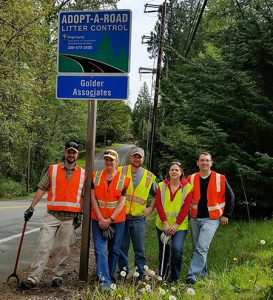 Golder’s Redmond (Washington) Office has been recognized for the fifth straight year as a Best Workplace for Waste Prevention and Recycling – reaching “Honor Roll” status. This King County initiative shines a light on businesses with “exceptional commitment to recycling and reducing the amount of waste their company sends to the landfill.” Harnessing their colleagues’ passion for taking care of the environment and their community, the Redmond Environmental and Sustainability Committee is the driving force behind the program of activities that has resulted in the ‘Honor Roll’ achievement. Activities include the King County Adopt-A-Road program and the “Office Trading Post,” which facilitates the reduction, reuse, and recycling of office supplies and equipment, instead of purchasing new items.
Golder’s Redmond (Washington) Office has been recognized for the fifth straight year as a Best Workplace for Waste Prevention and Recycling – reaching “Honor Roll” status. This King County initiative shines a light on businesses with “exceptional commitment to recycling and reducing the amount of waste their company sends to the landfill.” Harnessing their colleagues’ passion for taking care of the environment and their community, the Redmond Environmental and Sustainability Committee is the driving force behind the program of activities that has resulted in the ‘Honor Roll’ achievement. Activities include the King County Adopt-A-Road program and the “Office Trading Post,” which facilitates the reduction, reuse, and recycling of office supplies and equipment, instead of purchasing new items. The Battle of Vimy Ridge in France in 1917 has become a defining moment in Canada’s history. Over four grueling days, Canadians from across the country fought side by side, as all four divisions of the Canadian Corps waged a bloody battle. The Canadians were victorious but with huge loss of life, and over 10,000 men killed or wounded. Thousands of those men killed in battle are still missing and for the families of those missing men, their stories remain unresolved. Volunteering their vacation time to work on the project, six Golder colleagues helped locate 44 of these missing men by leveraging expertise in geophysical, GIS, and archaeology and providing closure to the families of these men in time for observance of the one hundred year anniversary of the battle in 2016.
The Battle of Vimy Ridge in France in 1917 has become a defining moment in Canada’s history. Over four grueling days, Canadians from across the country fought side by side, as all four divisions of the Canadian Corps waged a bloody battle. The Canadians were victorious but with huge loss of life, and over 10,000 men killed or wounded. Thousands of those men killed in battle are still missing and for the families of those missing men, their stories remain unresolved. Volunteering their vacation time to work on the project, six Golder colleagues helped locate 44 of these missing men by leveraging expertise in geophysical, GIS, and archaeology and providing closure to the families of these men in time for observance of the one hundred year anniversary of the battle in 2016.  In May 2016, a wildfire swept through the northern Alberta city of Fort McMurray, destroying approximately 2,400 homes and buildings, and forcing the evacuation of more than 100,000 residents, including Golder employees from our Fort McMurray office. In the wake of this disaster, Golder people stepped up – donating more than $40,000 CDN – including corporate matching funds, to the Red Cross.
In May 2016, a wildfire swept through the northern Alberta city of Fort McMurray, destroying approximately 2,400 homes and buildings, and forcing the evacuation of more than 100,000 residents, including Golder employees from our Fort McMurray office. In the wake of this disaster, Golder people stepped up – donating more than $40,000 CDN – including corporate matching funds, to the Red Cross. The ‘Golder Boulders’ volleyball team participated in the 22nd Heatwave for SickKids Volleyball Tournament at Toronto’s Ashbridges Bay. This is the 7th year in a row for Golder Boulders and despite valiant efforts and having lots of fun, the team only had one win, but are winners for raising awareness and funds for SickKids Hospital.
The ‘Golder Boulders’ volleyball team participated in the 22nd Heatwave for SickKids Volleyball Tournament at Toronto’s Ashbridges Bay. This is the 7th year in a row for Golder Boulders and despite valiant efforts and having lots of fun, the team only had one win, but are winners for raising awareness and funds for SickKids Hospital. Golder staff from the Tampa (Florida, US) office collected food and toys for Thanksgiving and Christmas for distribution through Metropolitan Ministries and the local crisis center. This collection program has been running for a number of years and is now a well-establish activity on the calendar of Golder’s Tampa office.
Golder staff from the Tampa (Florida, US) office collected food and toys for Thanksgiving and Christmas for distribution through Metropolitan Ministries and the local crisis center. This collection program has been running for a number of years and is now a well-establish activity on the calendar of Golder’s Tampa office.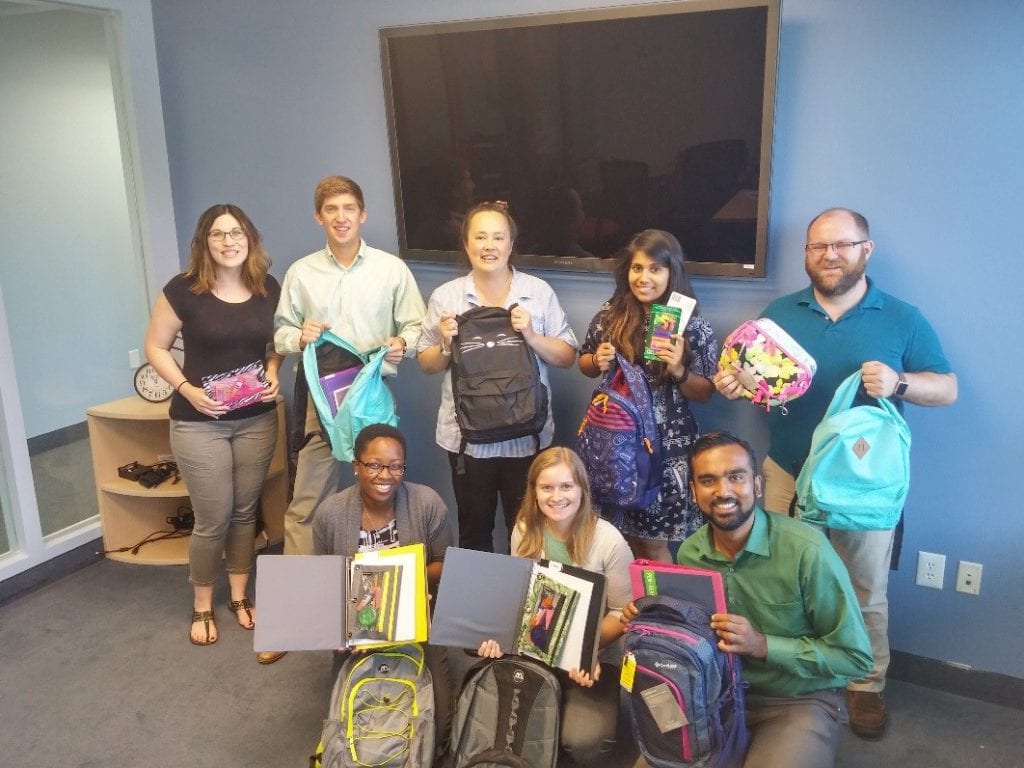 The Mt Laurel office in New Jersey (US) got into the back-to-school spirit by supporting Volunteers of America’s Operation Backpack. One of the most devastating consequences of homelessness is the impact it has on a child’s education. Operation Backpack is a program which aims to lessen the financial burden of families at-risk of homelessness or living in shelters by helping with school supplies.
The Mt Laurel office in New Jersey (US) got into the back-to-school spirit by supporting Volunteers of America’s Operation Backpack. One of the most devastating consequences of homelessness is the impact it has on a child’s education. Operation Backpack is a program which aims to lessen the financial burden of families at-risk of homelessness or living in shelters by helping with school supplies. Jeremy Yeglin, Senior Engineer from the Houston (US) office, volunteered his time for many weeks to help with the demolition of houses on the west side of Houston in the wake of Hurricane Harvey that devastated large parts of the US and Caribbean in 2017.
Jeremy Yeglin, Senior Engineer from the Houston (US) office, volunteered his time for many weeks to help with the demolition of houses on the west side of Houston in the wake of Hurricane Harvey that devastated large parts of the US and Caribbean in 2017.
